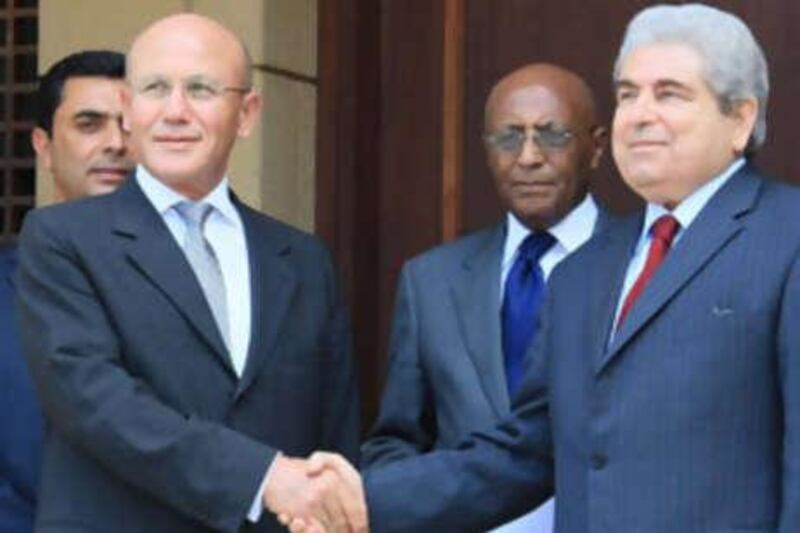Rival Cypriot leaders today set Sept 3 as the date when they will begin direct negotiations on ending the island's 34-year-old division. During a two-hour meeting, President Demetris Christofias, a Greek Cypriot, and the Turkish Cypriot leader Mehmet Ali Talat also decided that the results hammered out between them will be put to referendums in their two communities. Today's meeting covered a review of progress made by technical committees set up at earlier talks in March. "Having made their final review, the leaders decided to start their fully fledged negotiations on Sept 3, 2008 under the good offices mission of the UN secretary general," said the UN Chief of Mission in Cyprus, Taye-Brook Zerihoun, reading a joint statement from the two leaders.
"The aim of fully fledged negotiations is to find a mutually acceptable solution to the Cyprus problem, which will safeguard the fundamental and legitimate rights and interests of Greek Cypriots and Turkish Cypriots," he said. "The agreed solution will be put to separate and simultaneous referenda," Mr Zerihoun added. A similar vote, on a peace plan drawn up by the United Nations former secretary general, Kofi Annan, in 2004, drew a resounding "yes" from the north but was strongly rejected by the south, leading to paralysis in peace efforts.
But in February, Mr Christofias was elected president on a platform of reviving reunification talks which went nowhere under his hardline predecessor Tassos Papadopoulos. Since then, a flurry of diplomatic moves plus the opening of a crossing in Ledra Street linking south and north in the symbolic heart of Nicosia have seen fresh optimism over efforts to solve the problem. The lack of a Cyprus settlement is viewed as a major stumbling block to Turkey's European Union ambitions.
The UN Secretary General Ban Ki-moon has said he wanted direct negotiations to start soon, and he has named Australia's former foreign minister Alexander Downer as his special envoy for Cyprus. Today's statement by Mr Christofias, president of the internationally recognised government, and the Turkish Cypriot leader Mr Talat, said: "As a reflection of the heightened engagement, the leaders have agreed to establish a secure hotline to facilitate direct contact between them."
Speaking yesterday, Mr Talat said he wanted intensive negotiations. "Our objective is to reach a settlement in a short time... I believe we can make it by the end of 2008," he told Turkey's Anatolia news agency. "Starting from September, we have four months... This much time is sufficient. It can be extended a little bit if necessary, but resolving the Cyprus question in a short time must be our primary objective."
The international community had remained cautious ahead of Friday's meeting, but both the United States and Britain boosted diplomatic links with the two sides. Mr Christofias has warned against outside pressure for a quick-fix settlement, saying it would only backfire, and has refused to accept deadlines or restrictive time frames. An agreement between Mr Christofias and Mr Talat, both regarded by the international community as "pro-settlement", is seen as the best chance for peace since the failed UN reunification blueprint in April 2004.
On July 1 they agreed in principle on single citizenship and sovereignty in a reunified island and vowed to meet on July 25 for a "final review" of preparatory negotiations before launching proper peace talks. Cyprus has been divided since 1974 when Turkish troops occupied its northern third in response to an Athens-engineered Greek Cypriot coup seeking enosis, or union, with Greece. Thousands of Greek Cypriots living in the north fled south and Turkish Cypriots fled north, with both communities abandoning property.
Displaced Greek Cypriots outnumbered Turkish Cypriots by about four to one ? roughly the same proportion as the 1974 population. The Turkish Cypriots nationalised Greek Cypriot land and property and most of it was distributed to Turkish Cypriots displaced from the south and to settlers from Turkey. *AFP






